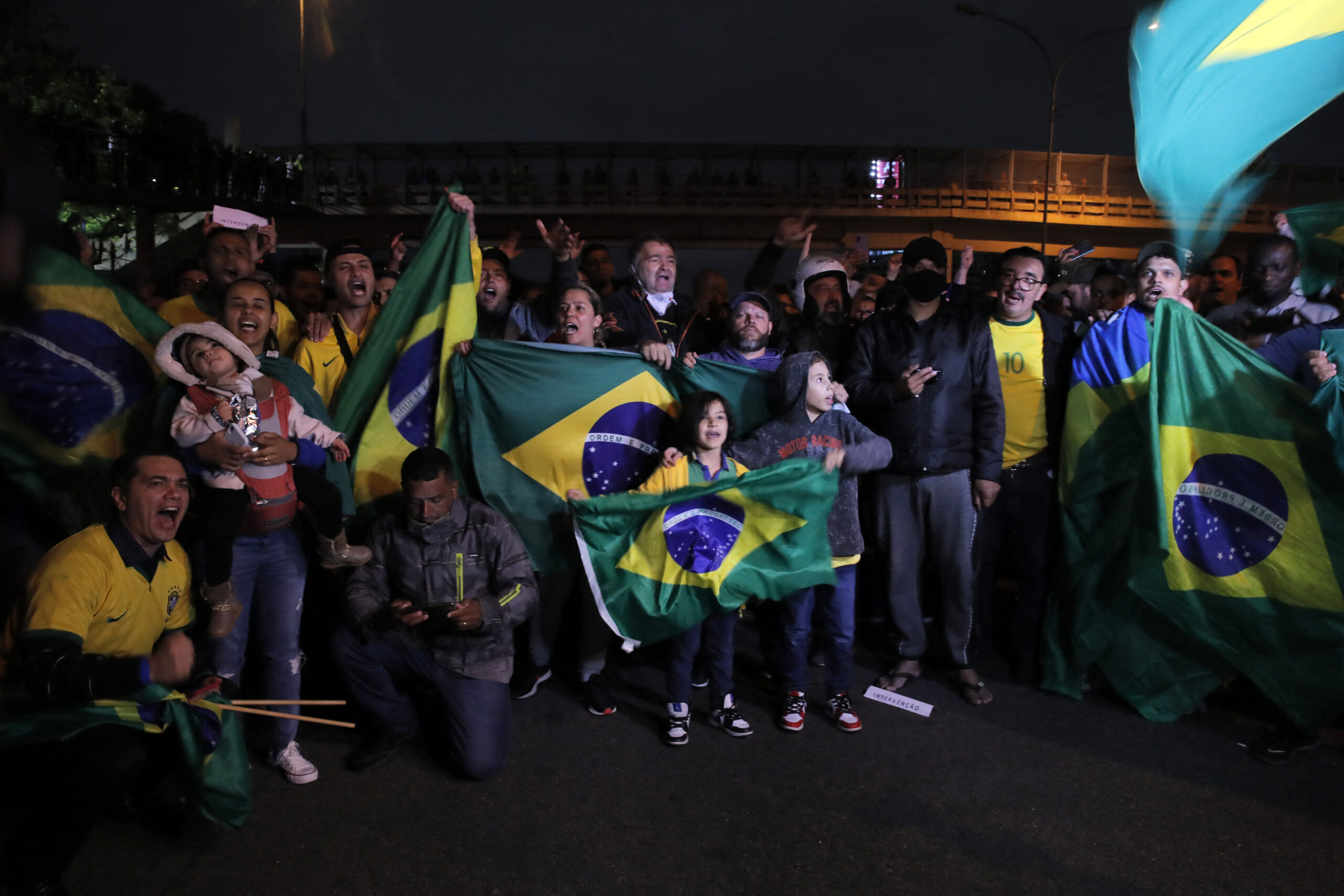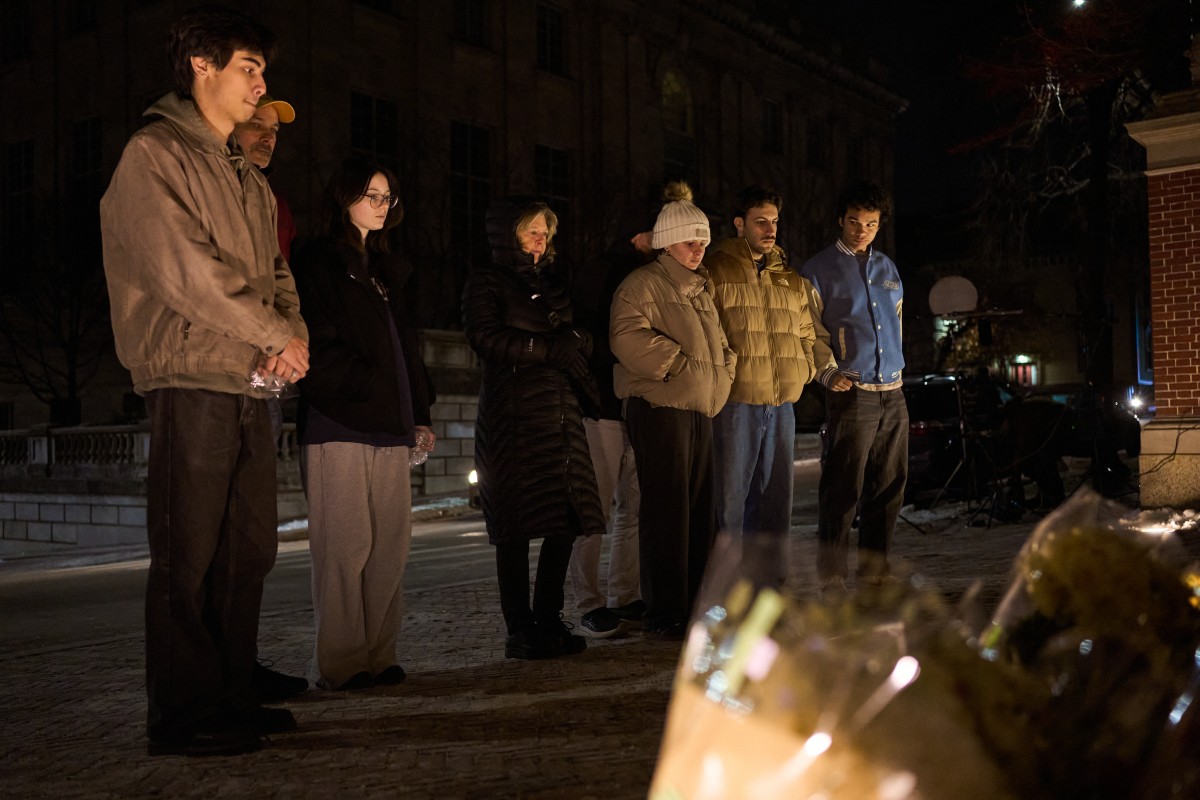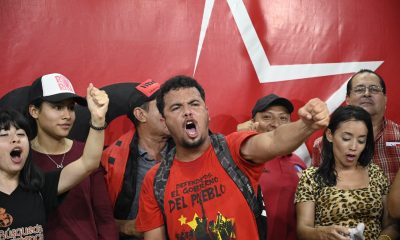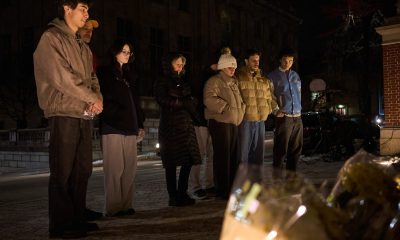International
Protests wane in Brazil, but diehards stand by Bolsonaro

| By AFP | Luján Scarpinelli y Florian Plaucheur en Rio de Janeiro |
Protests in deeply polarized Brazil have dwindled since presidential elections nearly two weeks ago but some hard-core supporters of President Jair Bolsonaro remain in the streets.
A retired metalworker, Jose Carlos Flamino, stood at his encampment on Friday near a military barracks in Sao Paulo and vowed to remain “as long as is necessary.”
He still doesn’t accept that Luiz Inacio Lula da Silva, a leftist former president who squeaked out a 50.9 percent victory over Bolsonaro’s 49.1 percent in the October 30 vote, won fairly and squarely.
“The balloting that gave victory to Lula is not reliable,” said Flamino, 53, demanding the military overturn the vote.
He’s not alone. Other diehard Bolsonaro supporters are camped out with him at the Sao Paulo garrison and at military barracks across Brazil.
Bolsonaro, a retired army captain, “was a victim of an injustice but we are fighting here for the fatherland,” said Aguinaldo Coimbro, a 52-year-old market analyst, a Brazilian flag draped over his shoulders.
About 100 people with him outside the Sao Paulo military base chanted, “SOS, armed forces,” and called on the military to “save Brazil.”
Most wore green and yellow clothing, the colors of the national flag that has turned into a symbol for Bolsonaro followers.
“Brazil didn’t elect anyone. The people don’t accept this. We don’t want to become Venezuela. Our freedom doesn’t have a price,” said Lena Pasqualini, 62, a jewelry saleswoman resting at a support center with donated food for the protesters.
At a temporary encampment of protesters next to the central Duque de Caxias garrison in Rio de Janeiro, around 100 people remained on Friday morning, down from several thousand in the days after the October 30 runoff election.
Even as demonstrations melt to only a few dozen people, protesters insist they represent multitudes.
The election “was stolen, and that’s why all of Brazil is in the streets,” said Paulo Campelo, 70, a retired soldier.
“We want the army to eliminate those bastards who want to authenticate the fraudulent elections,” Campelo added.
Lula: ‘One wins, one loses’
The Armed Forces said Friday in a statement that “the solution to possible controversies… must make use of the legal instruments of the democratic rule of law.”
Protesters assert that a “fraud” was perpetrated with the electronic ballot box system, used in Brazil since 1996, and questioned without proof by Bolsonaro.
Numerous international observers and a report by the Armed Forces themselves released on Wednesday fully dispute that allegation.
Lula on Thursday appealed to the “minority in the streets” to go home.
“Democracy is that, one wins, one loses,” the president-elect said. “How many times have I cried because I lost?”
Bolsonaro, who has not openly acknowledged his defeat and has practically disappeared from public life for more than a week, asked his supporters to take down hundreds of roadblocks they threw up after the vote, but supported protests elsewhere.
On Friday Brazilian roads were completely back to normal, the Federal Highway Police told AFP.
International
Rubio rules out 2028 presidential bid if Vance runs

U.S. Secretary of State Marco Rubio said he would not seek the presidency in 2028 if current Vice President JD Vancedecides to run as the Republican nominee to succeed President Donald Trump.
“If JD Vance runs for president, he will be our candidate, and I will be one of the first people to support him,” Rubio said in an interview with Vanity Fair, in which he appeared alongside other senior members of the presidential cabinet.
Rubio, 54, and Vance, 41, are widely viewed as two of the leading Republican figures who could headline the party’s ticket in the 2028 election. Under the U.S. Constitution, Trump is barred from seeking another term after completing two presidential mandates.
In a lighthearted moment during the interview, Vance jokingly offered photographers $1,000 if they managed to make him look better than Rubio in the photos. Both leaders have received public backing from Trump, who last October floated the idea of a joint ticket featuring Rubio and Vance, without clarifying who would lead it.
“I think that if they ever teamed up, they would be unstoppable. I don’t think anyone would run against us,” Trump said at the time.
White House Chief of Staff Susie Wiles, who also took part in the interview, confirmed that Trump does not intend to violate the 22nd Amendment, which prohibits a third presidential term, though she acknowledged that the president is “having fun” with speculation about a possible return to office.
Rubio, the son of Cuban immigrants, served as a Republican senator from 2010 to 2025. He sought the party’s presidential nomination in 2016 but was defeated by Trump after a bruising primary contest. His name was floated as a potential vice presidential pick in 2024, but Vance ultimately secured the spot. After taking office, Trump appointed Rubio as secretary of state, making him the first Latino to hold the position.
International
Authorities search for armed and dangerous suspect in fatal Brown University attack

According to the statement, investigators are “seeking the public’s help to identify and speak with an individual” who was seen “near” the suspect at the time of the attack.
The Providence Police Department in Rhode Island released three photos of the person of interest, whose face has been blurred. In the images, the individual is wearing navy blue clothing, what appears to be a green hood, and carrying a light-colored backpack.
Earlier, authorities had released several photos and videos of a suspect described as “approximately 5 feet 8 inches tall, with a stocky build,” dressed in dark clothing, with their face covered by a surgical mask and wearing a beanie. The suspect’s identity remains unknown.
Authorities are offering a $50,000 reward for any information leading to the identification, arrest, and conviction of the person responsible for the killings, who is considered armed and dangerous.
The gunman opened fire on Saturday at Brown University’s engineering and physics building, where exams were being held, killing students Ella Cook and Mukhammad Aziz Umurzokov. The names of the nine people injured have not been released.
International
Police investigate deaths of Rob Reiner and wife as apparent homicide

The Los Angeles Police Department (LAPD) is investigating the deaths of Hollywood actor and filmmaker Rob Reinerand his wife as an “apparent homicide,” amid a wave of tributes to the director of classics such as When Harry Met Sally.
According to U.S. media reports on Sunday, Rob Reiner and Michele Singer Reiner were found dead at their Los Angeles mansion with what appeared to be stab wounds.
Several political figures shared messages of condolence following the reported deaths of the director of A Few Good Menand his wife.
While the LAPD did not officially confirm the identities of the victims, it stated that homicide detectives were dispatched to the Reiner residence.
“At this time, no additional details are available and the investigation into an apparent homicide is ongoing,” the Los Angeles Police Department said in a statement posted on social media.
LAPD Deputy Chief Alan Hamilton told reporters that no arrests have been made and that no individuals are currently being questioned as suspects.
“I’m not going to confirm whether anyone is being questioned at this moment or not. We are going to try to speak with as many family members as we can,” Hamilton said.
CNN reported that a family spokesperson confirmed the deaths of Reiner and his wife.
California Governor Gavin Newsom, former U.S. President Barack Obama, and former Vice President Kamala Harrisissued statements expressing their condolences.
-

 Central America4 days ago
Central America4 days agoPanama seizes over three tons of drugs hidden in Caribbean port container
-

 International4 days ago
International4 days agoPolice investigate deaths of Rob Reiner and wife as apparent homicide
-

 Central America4 days ago
Central America4 days agoOAS urges swift recount in Honduras as election results remain uncertain
-

 Central America3 days ago
Central America3 days agoEl Salvador ranks among top countries in the Americas in fight against organized crime
-

 Central America3 days ago
Central America3 days agoBukele says AI partnership with xAI will transform public education in El Salvador
-

 International2 days ago
International2 days agoRubio rules out 2028 presidential bid if Vance runs
-

 Central America2 days ago
Central America2 days agoArrests and clashes in Tegucigalpa as vote count continues after Honduras election
-

 International2 days ago
International2 days agoAuthorities search for armed and dangerous suspect in fatal Brown University attack


























